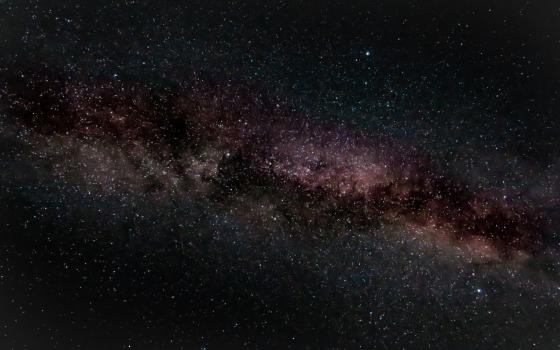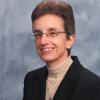At a recent workshop on "Laudato Si': On care of our common home," a professor from the engineering department laid out the numbers on global warming, indicating that in the next 10 years the warming trend will dramatically increase. Despite all the information available and the seemingly infinite number of workshops and conferences on the environment, our impending ecological crisis is getting worse instead of better. Fifty years ago, the historian Lynn White claimed that the roots of the ecological crisis are religious in nature. The primacy of spiritual reality over material reality has led to a mood of indifference with regard to the natural world. Because the roots of the problem are religious, he said, the remedy must be religious as well.
What does he mean by the "religious roots" of the environmental crisis? For White, it meant that Christianity, by emphasizing spiritual reality over material, has rendered us other-worldly and somewhat indifferent about creation. With all but humans excluded from grace, Christians are decidedly anthropocentric. Surprisingly, he named St. Francis of Assisi the patron saint of ecology. Francis was a materialist who rejected the intellectual emphasis of his time (Neoplatonism) and focused on concrete reality. He found the otherness of God in the nearness of the leper; the splendor of divinity in the humility of a flower. Francis' world was charged, as Gerard Manley Hopkins wrote, with the grandeur of God. His world was a spiritual reality at the heart of the physical world, and this reality held a place for his soul to ascend to God.
In her book The Pearly Gates of Cyberspace, science writer Margaret Wertheim offers an insightful discussion on the paradigm shifts of space. She suggests that the medieval Christian world picture had both a physical and spiritual realm. It incorporated a space for the body and a space for the soul. The physical and the spiritual mirrored one another, and the link between the two resided in the human person as the cosmic center. While the Earth was physically at the center of the cosmos, surrounded by the heavens and the firmament of stars, humanity was the center of an invisible spiritual order.
The whole of the universe and everything in it was linked by a great spiritual hierarchy, the Great Chain of Being that descended from God. Humans stood halfway between the ethereal beings of the heavens and the material things of Earth. As material beings with spiritual souls, humans were the linchpin of the whole cosmic system. The human person as the center of the universe meant not an astronomical position, but the center of the spiritual and material orders.
Within this finite physical universe one could imagine room beyond physical space, since the cosmos was governed by the Primum Mobile, the outermost sphere of a series of concentric "celestial spheres" that formed the universe. Beyond the Primum Mobile and literally outside the universe was the Empyrean Heaven of God which was beyond space and time. Both Thomas Aquinas and Bonaventure wrote their theological works in light of this cosmology of medieval space, and both insisted on the reality of an immaterial, nonphysical domain.
The rise of modern science brought with it the conquering of space. Between Aristotle and Einstein, a truly revolutionary shift occurred in our conception of space. For Aristotle, space was but a minor and rather unimportant category of reality. By the 17th century, space meant the "whole of reality," leaving no room for any other kind of space to exist. The concept gave rise to a bold new mechanistic philosophy that saw the world not as a great spiritual hierarchy but as a vast machine. Newton made space the formal background of the universe, the absolute frame of all action. Yet Newtonian space possessed no intrinsic qualities of its own; space played a secondary, subservient role — a backdrop for the action of matter.
Modern mastery of the physical world is shown in our scientific understanding of physical space. In the last five centuries, we have mapped the whole of terrestrial space, as continents, ice caps and ocean floors have yielded their secrets to science. Our understanding of physical space now extends beyond our Earth, to the moon and other planets. On the micro level, particle physics has been mapping subatomic space; neuroscientists are now mapping the space of our brains. While we have been mapping and mastering physical space, we have lost sight of any kind of spiritual place in which spirits or souls might reside. It is a modern cosmological fact that the whole of our reality is taken up by physical space, and there is literally no place within this scheme for anything like spirit or soul to rise above the physical world.
Wertheim sees the conquering of space by modern science and the eviction of the spirit — both the divine Spirit of God and the transcendent human spirit — as the impetus behind the exponential rise of cyberspace. Just as medieval Christians believed in a physical space described by their science (natural philosophy) and a nonphysical space that existed outside the material domain, so too the advent of cyberspace returns us to a dualistic world view. Once again, we have a material realm described by science and an immaterial realm that operates on a different plane of the real. Cyberspace offers the space of infinite possibilities where the human spirit can soar. It is the new space of transcendence, the realm of the new empyrean heavens, now readily accessible by a touch of a button.
Wertheim's thesis is compelling, since the discoveries of modern science have centered on cosmological shifts and new understandings of space. Cyberspace is the new frontier of the spiritual transcendence that eludes the grasp of modern science. It is interesting that White wrote his famous article on "The Historic Roots of our Ecological Crisis in 1967" around the same time Gordon Moore of Intel predicted that computing power would rise exponentially. Indeed, his prediction has come true. Computer technology has changed the landscape of modern culture while the ecological crisis continues to deepen.
The truth is we need a spiritual outlet, a place to transcend ourselves through imagination and creativity. Institutional religions offer old cosmologies of closed space. On the positive side, the church offers a place for the soul to ascend to God; on the negative side, this space is closed and bounded by the Dionysian hierarchies: the ecclesiastical and celestial hierarchies. The space of the institutional church is a patriarchal space with no room for democracy, mutuality or shared power, all of which can be found in cyberspace. The church portrays heaven as the place of spiritual perfection; computer life sees the space of unlimited possibilities as virtual heaven. Cyberspace is an open "ecclesia" where gender, race, color or creed make no difference whatsoever. One can join a networked community without having to argue or defend gender or patriarchy. In the infinite landscape of cyberspace, we can transcend our prosaic lives defined by gender, race and creed.
Technology has taken over the space of religion, and the trend will not reverse any time soon. We long to transcend ourselves, to strive for the more, to become different persons. Technology is no longer a tool; it is an existential reality. We in the Global North are computer-dependent in just about every facet of our daily lives. We created the tools of technology, but now the tools are creating us. The term "cyborg" symbolizes the new hybrid of human and machine organized by a new configuration of networked information.
Despite the lure of cyber transcendence, our souls are not at rest; we cannot find the peace we long for. Loneliness has increased in our cyberworld; we are more wired together than ever before and yet more lonely. The human brain is literally changing with constant computer use. Studies show that constant computer use is enhancing the narrow left brain of logic and analysis, to the exclusion of the capacious right brain, which is connected to the body and the wider world. The brain is a "use it or lose it" organ. By spending the majority of our waking hours in Googleland, we are becoming more forgetful, impatient and narcissistic; even worse, our capacity to think is diminishing (due to a "thinning out" of the frontal cortices).
Yet the space of cyberspace, like the medieval heavens, is transcendent, alluring and spiritually seductive. We can find or become anything we dream or imagine online. Just as the saints of old imagined and undertook heroic sacrifices for the greater glory of God, we, too, long to become something different — but without sacrifice. The computer circumvents the arduous process of conversion by creating a "wormhole," a bending of space-time that enables ready access to other worlds. Our alternate lives are a mere click away, keeping us tethered to our devices. This cyber soul-space is much more enticing than planet Earth because the infinite possibilities of cyber space keep the flames of human desire enkindled 24/7.
In a sense, Lynn White was correct. Our ecological problems will continue to deepen unless we recognize the heart of the problem is the existential need for spiritual space. Our institutional religions do not provide a breathtaking openness for the human soul to soar. Teilhard de Chardin saw the problem early on. He spoke of Christianity as passive, resigned and consigned to a cosmos that no longer exists. Because spiritual energy is vital to the evolution of life, Teilhard thought that we must reinvent ourselves religiously, and he set about his life's work toward this goal.
We have yet to realize, however, a new synthesis between science and religion, a type of religion that is at home in an unfinished universe. But this is the key to a renewed sustainable Earth. By conquering physical space, science has unwittingly shown our deep, felt need for religion. Our souls need a place apart from the physical world of everyday stuff, a place to stretch toward the infinite and wonder about things that do not physically exist. How we reconceive religion in a scientific age is the basis of a healing Earth. Pope Francis is right to take the lead in this regard, but his spiritual wisdom is not enough. We need a complete religious revolution — to liberate God from the grip of Greek metaphysics, to liberate divine revelation from the institution of religion; to reimagine a new heaven and a new Earth. The Christian tradition has all that it takes to make this revolution possible. In a sense Jesus initiated a new big bang: "I have come to cast fire on earth and how I wish it were ablaze already" (Luke 12:49).
Computer technology should inspire us to rediscover religion, a technology of the spirit that deepens love, widens compassion, expands forgiveness and radiates beauty; a democracy of the spirit open to healing and wholeness, where neither male nor female, gender or power determine relationships, only love. A new church for a new world.
But the power of newness comes from within. Science has conquered space but it has not conquered the soul. The inner universe is still a vast expanse of infinite love and life. The religious imagination must be set free to realize that all that we seek in the outer life can be found in the inner universe, what the poet Rainer Maria Rilke called the "outer space within" where "through us the birds fly silently … [where] in me grows the tree."
The heart is the space of unlimited love and thus unlimited power because at the center of the heart is the pure glory of God. Etty Hillesum discovered this inner treasure in the midst of war, violence and human destruction. If our souls cannot find a renewed spiritual space on Earth, then we too will face destruction, but this great suffering will be our gift. For in the fires of suffering, love is purified, and only a pure love can open our eyes once more to the gift of life. Then and only then, will we remember the future because memory is not of the past alone. Rather it is our ability to re-connect with our birthright of belonging to the cosmos. Memory is to be membered — to the whole of reality: past, present, and future. Without memory there is no future.
[Ilia Delio, a member of the Franciscan Sisters of Washington, D.C., is the Josephine C. Connelly Endowed Chair in Theology at Villanova University. She is the author of 16 books, including Making All Things New: Catholicity, Cosmology and Consciousness (Orbis Books 2015), and the general editor of the series Catholicity in an Evolving Universe.]
Enhance your Holy Week and the Easter season by visiting the free Celebration 'Lenten / Easter' page.


